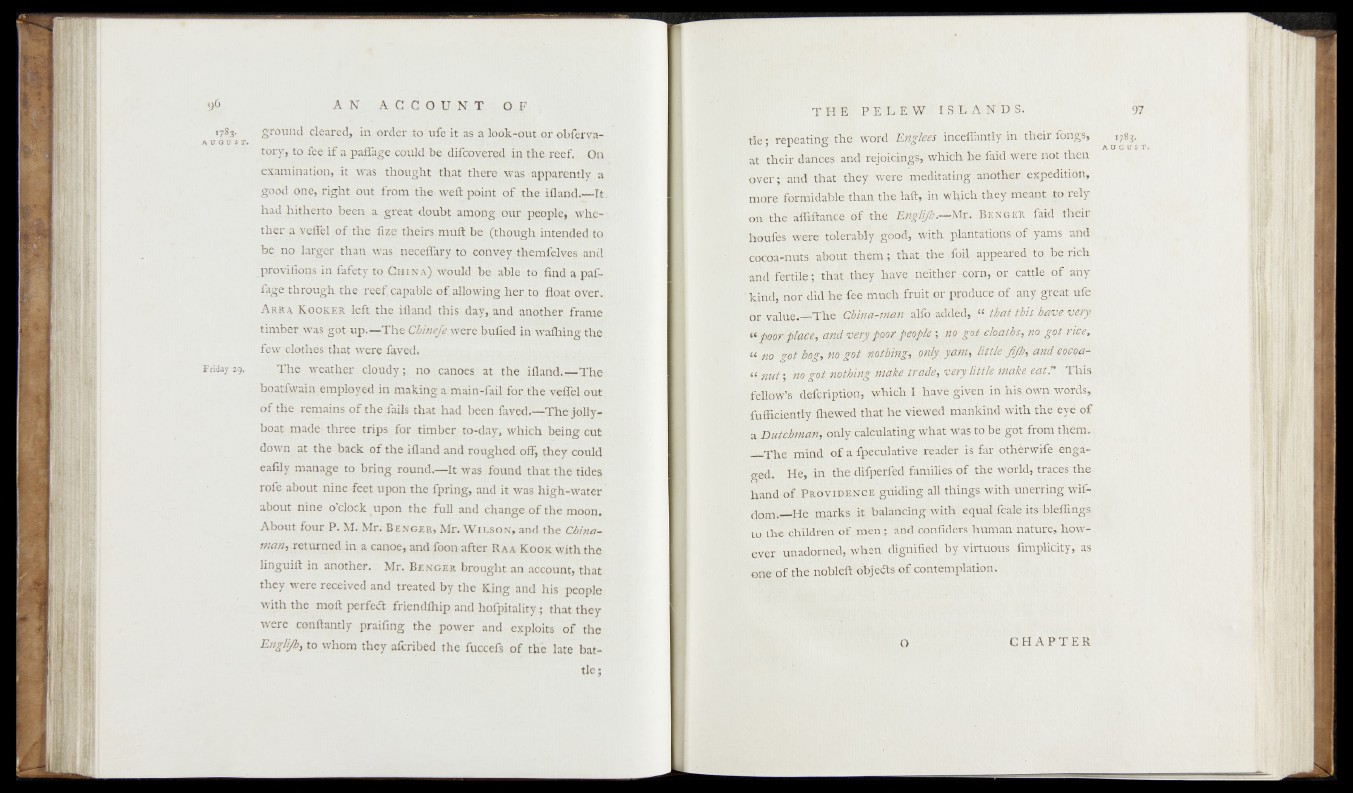
*7%
A U G U S X.
Friday 29.
A N A C C O U N T O F
ground cleared, in, order lo ufe it as a look-out or obferva-
tory, to fee if a paflage amid be difcovered in the reef. On
examination, it was thought that there was - apparently a
good one, right out from the weft point of the ifland.— It.
kad hitherto been a great doubt among our people, whe- •
ther a yeffel of the fize theirs muft be (though intended to
fee no larger, than was'; necefiary to eonyey themfelves and.
provifiousin fafety fo Ohi n a)|would be, able to find a paf-
fage-through the reef capable of allowing her .to float over.
A rra K ooker left the ifland. this day, and another frame
timber was got up.—Thz Chinefe were bufied in waffling the
few clothes that were faved.
The weather cloudy; no canoes at the ifland.— The
boatfwain employed in making a main-fail for the veflel out
of the remains of the fails that had been faved.— The jolly-
boat made three trips for timber to-day, which being cut
down at the back of the ifland and roughed off, they could
eafily manage to bring round.— It was found that the tides
rofe about nine feet upon the fpring, and it was high-water
about nine o’clock upon the full and change of the moon.
About four P. M. Mr. B enger, Mr. W ilson, and the China-
man, returned in a canoe, and foon after Raa Kook with the
linguift in another. Mr. Benger brought an account, that
they were received and treated by the King and his people
with the moft perfect friendfliip and hofpitality; that they
were conftantly praifing the power and exploits of the
Knglifhi to whom they afcribed the fuccefs of the late battle;
T H i P E'-JL E.W I S L A N D S; 97
tie;- repeating} th |l !, \ ^ d r d 4 ^ ^ ^ inGeflantlyin their fongs,
at their dadoes' and 'rejoie^^kwhi'ch h e laid were not then
oyer; and thatKtbey, were- Meditating another expedition,
mare fpkmi^bje than ^ laflr, in,Which they meant to rely
on th© afliftance BenG£R ™ their
houfes were tolerab^jsglo^ with plantations;of* .yams and
cooQa-nuts aboqt them ;.yhat„the - foil appeared to. fle rich
and; fertile; thftt ;fche'y. h^ye.„neit^erf corn, or cattle of -any
'kindi nor did,he feeupseh fruit or produce.,of any great ufe
or value;—The C b in a -m a n ^ Q added, that this very
place,* j^nd npS^*s§J^P^|||
“ .no nothings IfiljjS yam, littie'Jl/h, and cocoa-
H 'n^-^^^^i^nothiJtg\rnake trade^ vgrj/ htil'e make .eatC Thi^
frllovy’s defcription, which I have given in his^awp ^ojfls, r
fufficiently fhewed that he viewed mankind with the;‘eye,of
a Dutchman, only calculating what was to he-got from them.
-slkLxhe mind of a fpeculative reader is far otherwife ^engt-
ged." He, in the difperfed families of the wprlfl, traces the
hand ofrProvidence guiding all things with unerring wif-
dam.—He piarks it balancing Avith equal fcalhitstbleflin,^;
to the children of „men; and .cqnfiders human natflre, how- j
ever unadorned, when dignified by virtuous fi^iplicity^as
one of the nobleft objefrs of contemplation.
‘mm
A O G «r 8 T .
O CHAPTER